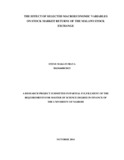| dc.description.abstract | Financial theories posit that stock prices are influenced by a number of macroeconomic
variables such as interest rates and exchange rates. For instance, economic theory
postulates that stock prices and interest rates are inversely related and that fluctuations in
exchange rates cause movements in stock market returns. These theories are based on the
view that stock prices represent the present value of discounted future cash flows and
therefore any events affecting a firm‟s cash flows should be reflected in the firm‟s stock
price. The objective of the study was to investigate the effect of selected macroeconomic
variables on the market returns of the Malawi Stock Exchange. After noting the
inadequacy of the Ordinary Least Squares (OLS) regression framework, a GARCH (1, 1)
model was employed in analysing the data. GARCH models usually work well in
instances where data is characterised by „volatility clustering‟. Weekly data for the
variables was used. Findings from the study confirmed that the macroeconomic variables
of interest rates and exchange rates have an impact on the market returns of the MSE.
Interest rates and exchange rates affected both the market mean returns as well as the
volatility of such returns on the MSE. In line with these findings, some of the policy
recommendations were that policy makers should seek to implement policies that do not
adversely affect investors and other economic agents. Strategies should be put in place to
achieve desired fiscal and monetary objectives without unduly influencing stock prices
on the MSE. The study also found that the high average interest rates are indicative of
high budget deficits which have a crowding out effect on the private sector. The fiscal
and monetary authorities should aim at implementing effective debt management
strategies aimed at lowering interest rates, controlling inflation and stimulating private
sector investment and Malawi‟s economic growth. | en_US |

